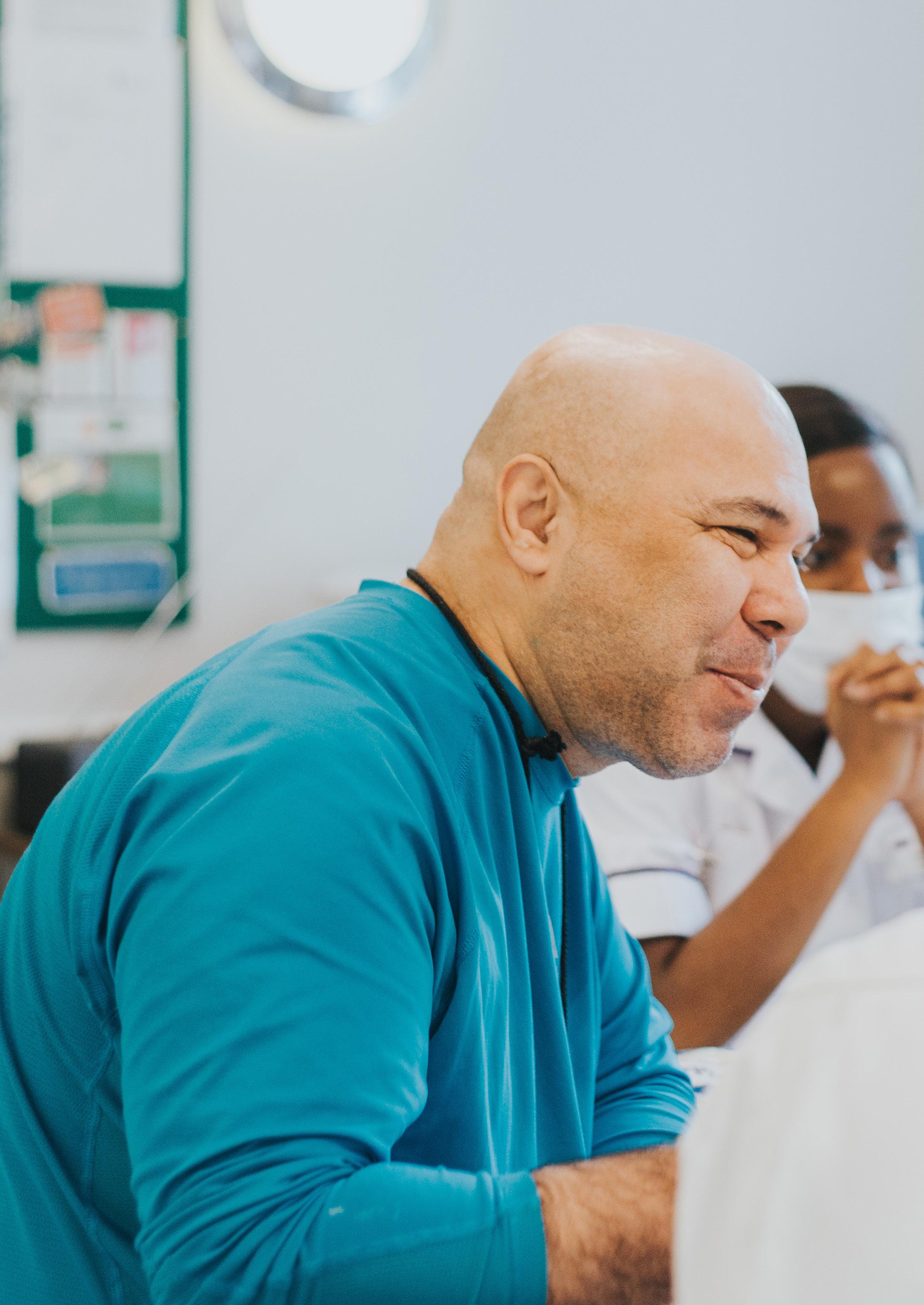




The last twelve months have been some of the most challenging we have faced as a Trust. Serious failings have been identified across our services and concerns raised about our organisational culture and leadership. We accept full responsibility for these failings and want to make changes in the best interests of the individuals who use our services, their families and carers, and our staff.
We are also required, by the Care Quality Commission (CQC) and others, to take action to improve the quality and safety of our services and how we run the Trust.
We shared a draft of our Improvement Plan earlier this year. Thank you for your feedback. Over the coming pages, you will find out more about our final
Improvement Plan, including how we have heard and taken forward your feedback. Our focus continues to be on getting the basics right, re-building trust and ensuring that we don’t make the same mistakes again.
Our Plan is significant in size and scope, with some actions targeted at specific services and others (the majority) impacting the whole Trust. Our Plan is being progressed in tandem with existing change programmes, such as the ongoing work to transform our community services and the delivery of our Digital Strategy.
We have tried to give a flavour of the key actions we are taking in each area later in this booklet, and provide examples of the ‘how’. We hope that you will want to learn more though. Further detail on our Improvement Plan can be found at
www.gmmh.nhs.uk/improvement-plan. Alternatively, if you have any questions, or want to share your views or get more involved, please contact ProgOffice@gmmh.nhs.uk
The common thread that binds our Improvement Plan - and will be vital to its success - is the meaningful involvement of service users and carers at every step of our journey.
We will strengthen your voice and hear you and learn from you at every level of our organisation. We will protect your human rights. We will co-design and deliver services in equal partnership with you.
We will transform services to deliver specialist care that is co-produced, place-based and trauma-informed.
We will make sure we improve accessibility to care, including when you are in a crisis. We will give you the support to keep you in your home environment for as long as is safely possible.
We will develop compassionate leaders.
We will continue to create diverse leadership that truly represents the communities we serve.
We will build effective systems and oversight processes to inspire confidence in our performance and quality.
We will have safely staffed wards which deliver therapeutic care.
We will have safe, clean, therapeutic environments where you can thrive.
We will only use restrictive practices as a last resort.
We will make GMMH a great place to work that is safe and supportive.
We will actively encourage you to speak up when things do not feel right.
We will recognise, develop and appreciate you.
Over the next twelve to eighteen months, we will be focusing our efforts on reaching a number of significant milestones across the five areas of our Improvement Plan.
Each milestone has been designed to help us achieve our ultimate goals and is described in more detail in the following pages. We know that reaching a milestone is only one measure of progress and we will also look to test that each milestone has had the desired impact and can be sustained.
On this timeline, we have given examples of the kind of progress you can expect to see. This list is not exhaustive and the milestones only show achievement and not, in any way, the weeks and months of collective effort it may take us to get to those points.
Key
Patient Safety
Clinical Strategy and Professional Standards
People
Culture
Leadership and Governance
2023
July 2023
All regulatory and legal requirements relating to fire safety met
July 2023
Agreement reached on amount and type of risks the Trust will accept and Board members clear on key strategic risks
August 2023
Smoke Free Policy applied across Trust sites
July 2023
Fit for purpose governance structure developed and implemented
August 2023
August 2023
Freedom to Speak Up function strengthened
New National Standards of Healthcare Cleanliness met
September 2023
All medications stored safely and effectively
September 2023
Enhanced recruitment strategy for student nurses, registered nurses and consultant medical staff
September 2023
New Board Performance Report launched as part of new reporting model
September 2023
New model of care agreed for our Adult Forensic Services
September 2023
Complaints management process strengthened
September 2023
Fit for purpose
incident review process that supports effective learning established
October 2023
Service User Council established
October 2023
October 2023 New risk management system in operation
October 2023
Approach to identifying, assessing and managing risks strengthened
Robust mechanism for holding individuals and teams to account for performance agreed
November 2023
Strategy to reduce our use of restrictive practices agreed
November 2023
Team Accreditation Strategy agreed
November 2023
New Preceptorship Policy developed to help support and retain our student nurses
November 2023
Dedicated Resuscitation Team established
November 2023
Trust-wide Clinical Senate and system of Clinical Networks established
December 2023
Funding secured to safely staff our wards at all times
December 2023
Significant progress achieved in the co-production and co-delivery of services with people with lived experience
December 2023
Improved staff wellbeing offer in place
March 2024
Over £14million invested to improve our buildings, grounds and gardens
March 2024
Staff-side voice strengthened through new Workforce Partnership Forum
March 2024
Refreshed mandatory training offer in place that meets assessed need
March 2024
Substantive executive director vacancies filled
March 2024
Board leadership development programme completed
March 2024
Trust strategy refreshed to reflect improvement journey
March 2024
Cultural development programme implemented
March 2024
New management supervision policy in operation
March 2024
Around £2.5million spent on addressing high priority ligature risks
April 2024
Funding secure to safely staff our community services at all times
May 2024
Inclusive Cultures programme designed and delivered across the Trust
August 2024
Trauma informed care approach implemented across the Trust
April 2024
Matrons focused on the delivery of the 10 keys roles of a matron
July 2024
Learning Disability and Autism Strategy agreed
December 2024
Reflective practice programme rolledout to support staff following incidents
Your
Feedback
We have heard loud and clear that you share our concerns regarding the safety of staffing levels across the Trust.

Making sure we have enough registered, competent, skilled and experienced staff and that those staff feel supported and able to deliver high standards of care.
We will:
• Use evidence-based tools to gather data on staffing requirements (numbers and skill mix) across all our inpatient and community services – we have completed our initial data collection and are in the process of analysing the results.
• Bring together staffing data with service user, carer and staff feedback to determine future safe staffing establishments.
• Establish effective arrangements for identifying and escalating daily safe staffing issues and taking remedial action – these arrangements are in place but remain subject to continuous review.
• Take action to understand the impact of unsafe staffing levels on patient care – starting with our Adult Forensic Services and Woodlands Hospital.
• Recruit and retain staff and develop new roles which support patient care.
Promoting human rights and preventing the need to use restrictive practices. By restrictive practices, we mean restraint, seclusion, rapid tranquilisation and other practices such as blanket rules.
We will:
• Only use restrictive practices as a last resort and for the least amount of time possible.
• Embed our new Seclusion and Long-Term Segregation Policy, which is consistent with the standards set by the Royal College of Psychiatrists.
• Work preventatively with service users to reduce the likelihood of situations arising where restrictive practices may be needed – we will review the impact of our Positive Behaviour Support Pathways in our Psychiatric Intensive Care Units (PICUs) in Wigan and Salford and consider rolling out similar models across all of our services.
• Work with service users and carers to complete a strategic review of our use of restrictive practices and agree our longer-term reduction strategy.
• Make sure all our staff (both permanent and temporary) are fully trained in appropriate interventions, including how to prevent and manage violence and aggression.
• Accurately record and learn from all incidents where restraint or other restrictive practices are used – making staff feel safe and able to report incidents easily, as well as evidencing our commitment to learning, will be key to this.
Promoting the safe and effective use of medicines. This includes how we prescribe, handle and administer medicines to service users.
We will:
• Review the systems we have in place to make sure we use and store medicines safely and effectively – this will include implementing an automated system for monitoring the temperature of medicine fridges across the Trust.
Our approach to care and treatment will focus on maximising the things that go right and minimising the things that go wrong. We will protect all patients and service users from avoidable harm and create the conditions in which our staff can deliver care safely.
• Review our Self-Medication Policy and make sure all requests for self-medication are authorised by a pharmacist and that service users understand how to take their medications and store them safely.
• Ensure that observations post-rapid tranquillisation are completed in line with Trust Policy - this will be achieved through training staff in the observation standards with ongoing monitoring through our audit cycle and incident evaluation reporting into the Trust’s Medicines Management and Positive and Safe Groups.
• Make sure our pharmacy service can safely support all our services – a review is underway of the size and use of our pharmacy service to determine any required changes.

Ensuring our service users feel safe from sexual harm and are protected from any unwanted and inappropriate behaviours.
We will:
• Review and update our Sexual Safety Guidance, and the way in which we manage sexual safety risks, learning from the National Sexual Safety Collaborative.
• Support our staff to use a trauma-informed approach to proactively manage sexual safety.
• Ensure we learn from all sexual safety incidents and complaints.
• Maximise single gender wards with appropriate support
Making sure all our environments are safe, clean, fit for purpose and therapeutic.
We will:
• Maintain and continue to invest in our physical environments to enhance patient experience and outcomes - we have grown our in-house Maintenance Team and will invest over £14 million capital resources to improve our buildings, grounds and gardens in 2023/24.

• Complete our new North View Development on the North Manchester General Hospital site by late 2024 – improving privacy and dignity by eradicating the existing dormitory accommodation.
• Regularly monitor our environments and take action to deal with any issues quickly and effectively – we will continue to strengthen how we use information gathered via ‘Quality Circles’, walkabouts and routine audits, including those focused on cleanliness and infection prevention and control (IPC).
• Strengthen our approach to ligature risk management – this will include by introducing a more fit for purpose ligature audit tool and delivering targeted ligature audit training.
• Take action to address all high-risk ligature items – we have increased our investment in ligature risk management year on year since 2020/21 and are continuing this trend across the lifetime of the Improvement Plan. In 2023/24, we will spend just over £2 million on anti-ligature works, plus a further £450k to install doors with integrated vision panels at Laureate House that will support improved observations.
• Make sure staff are aware of all ligature risks in their environment and how to manage them effectively to maintain patient safety.
• Embed the new National Standards of Healthcare Cleanliness – you will see visible ‘Star Ratings’ appearing across the Trust that reflect the cleanliness of the area you are in.
• Strengthen our fire safety management system and ensure all staff are up to date with their Fire Safety Training – as part of this work, we will be reviewing our fire safety training needs against statutory guidance and best practice and making any required improvements.
• Become a smoke free Trust by supporting our staff to implement our Smoke Free Policy and providing tobacco-dependent service users with access to helpful resources.
We have listened to your feedback and will also take action on the following through Workstream two:

• Clinical senate – with support from AQuA, we will establish a clinical senate to provide clinical advice and leadership at all levels of the Trust. Our senate will be a forum for cross-specialty multi-professional expertise, collaboration and advice. An initial key task for the senate will be overseeing the establishment of our new clinical networks.
• Learning disability and autism (LDA) – working with our partners, we will develop a clear strategy for supporting people with learning disabilities and autism.
• Professional leadership for psychological therapies, allied health professionals (AHPs) and social care –we will strengthen the voice of these professions within our governance structures, supporting their professional development.
• Social care and social work – work alongside our Local Authority partners to establish effective governance arrangements that support us to deliver our social care responsibilities.
Working together with different professional groups, service users and carers and our partners to reshape and improve the way we deliver care.
We will:
• Make changes to how we deliver care to ensure that service users receive the right care, at the right time and in the right place, and care that is accessible to all.
• Develop and implement a new model of care in our Adult Forensic Services – this work is well underway and includes a focus on delivering the recommendations of the independent clinical review completed in October 2022.
• Transform our community mental health services to deliver specialist care that is coproduced, place-based, trauma-informed and enables us to meet all of our social care responsibilities.
• Adopt a collaborative and trauma-informed approach to care, in agreement with those who use and deliver our services – this will include recruiting a dedicated lead for Trauma-Informed Care and training our staff to recognise and respond sensitively to individuals affected by trauma.
• Put our research into practice to inform clinical decision-making and help us provide the best possible care.
Being clear about what we expect.
We will:
• Define all core clinical and professional standards across our services.
• Use formal accreditation methods as one of a number of means of checking we are meeting our core standards – we are in the process of developing an accreditation framework that will help us decide which schemes offer the most value.
• With support from the NHS Advancing Quality Alliance (AQuA), set up a system of clinical networks to drive consistent practice and standards of care.
• Roll-out a programme of reflective practice to support our staff following incidents and help us learn and improve our services.
• Ensure all staff understand their responsibilities under the Mental Health Act and operate in accordance with the associated Code of Practice – this includes making it easier for staff to record the reading of rights for informal patients and strengthening our process for Second Opinion Appointed Doctor (SOAD) referrals.
We will make sure that the care, treatment and support we provide meets need and achieves positive outcomes for our service users. We will set clear standards for ourselves, that are shaped by service users and clinicians and based on best practice and evidence.


Your feedback
Based on the feedback received, we will also look at ways of addressing the following through Workstream Three:
• Enabling increased access to continued professional development.
• Enhancing the quality and availability of any temporary staff we use, with the support of NHS Professionals.
• Communicating more effectively with hard to reach staff, such as Doctors in Training and those without easy access to online platforms.
• We launched a 12-month digital attraction campaign for mental health professionals, specifically care coordinators and senior mental health practitioners to join the Trust’s Manchester adult community mental health teams (CMHTs). This is part of the Trust’s business continuity response to help stabilist the Manchester adult CMHTs.

Making sure all of our staff have the right skills and experience. This will include making education and training easily accessible to all staff and supporting the achievement of personal development plans.
We will:
• Improve our appraisal and supervision processes – this includes through a re-launch of our appraisal and supervision conversation training.
• Ensure all members of staff are clear on expectations and able to access development opportunities that help them to realise their potential.
• Refresh our mandatory training offer for all staff to ensure it is fit for purpose, efficient and based on an up to date assessment of need.
• Implementing an enhanced recruitment and attraction plan for registered nurses and consultant medical staff.
• Work with Health Education England and our local universities to improve the rates of students joining and staying with the Trust – we are in the process of developing a new Preceptorship Policy and Framework that will give our students confidence and help them translate their knowledge and learning into practice.
• Strengthen our fast track appointment process for newly registered nurses.
• Support our Health Care Support Workforce to develop core skills in mental health and complete the Care Certificate as part of their induction programme – we are placing a particular focus on those who are ‘new to care’.
• Review and improve our clinical skills training offer, making sure that we get it right from the start and that staff are supported to keep their skills up to date.

We will create a safe and supportive working environment for all staff (clinical and non-clinical). Of utmost importance will be their wellbeing and development. We will foster open communication, set clear direction and enable our staff to play a vital part in improving both the service they work in and the Trust as a whole.
Enabling our leaders to uphold the values of the Trust and provide a safe and supportive working environment. We will support them to focus on the fundamental standards of care.
We will:
• Launch a new leadership programme called Role-Model, Coach, Care which focusses on the development of our leaders at all levels.
• Design and deliver a Ward Manager and Community Team Manager Leadership Programme.
• Standardise and re-enforce the critical role of our quality and operational matrons and support them to deliver their core matron responsibilities.

• Review our progress on creating diverse leadership teams and find ways to increase and support these, based on our findings.
Supporting wellbeing, improving how we communicate and engage with all staff, and showing appreciation for the work our they do.
We will:
• Work with staff to develop our staff wellbeing offer and make improvements based on their views and experience – we are exploring options for a new Employee Assistance Programme, which will provide expert support on both personal and work-related issues.
• Adapt our engagement activities to context and ensure they embrace all staff, regardless of role or background.
• Develop an online Employee Recognition Platform linked to our Trust values.



Your feedback

We share your view that real co-production will be key to fulfilling our commitment to ‘Building our Future Together’.
Using the knowledge and expertise of individual service users and carers, and service user groups, is critical now more than ever and we will underpin all aspects of our Plan with this core principle.
Through Workstream Four, we will work out the detail of how we meaningfully co-produce each of our areas of focus.
Strengthening the service user and carer voice and ensuring it is heard at all levels of the organisation.
We will:
• Design and develop services in partnership with people with lived experience.
• Co-deliver services alongside people with lived experience to improve access and outcomes.
• Create a service user council to strengthen the voice of service users and build this into our Trustwide governance structure.
• Actively listen to service user and carer experiences and show that we have taken action on thisfeedback will inform our quality improvement and wider development priorities.
• Work with service users and their representatives to improve and share learning from issues, concerns and complaints.
• Ensure the inclusion of service users and carers in the membership of key Trust meetings at all levels – this commitment is set out in our new ‘Standard Operating Procedure for the Conduct and Governance of Meetings’ and will be tested on an at least annual basis.
Fundamentally changing our culture and mindset – the way we do things – to create a healthy environment that supports the delivery of high quality care
We will:
• Work with external experts to assess and measure our existing organisational culture, based on the
outcomes of our ‘cultural diagnostic’, design and implement a cultural development programme - staff will be given opportunity to share their experiences and expectations and contribute to our onward vision.
• Deliver an Inclusive Cultures Programme across the organisation, that will increase people’s sense of belonging by creating inclusive and accessible environments where everyone feels respected and safe.
Creating opportunities to empower the staff voice across the organisation.
We will:
• Strengthen our Freedom to Speak Up arrangements by encouraging a culture where people feel safe and able to speak up and we drive learning through listening – we have reviewed our current arrangements and are in the process of appointing a new Freedom to Speak Up Guardian and recruiting and training Freedom to Speak Up Champions who will be visible across the Trust.
• Support our leaders to take a pro-active role in promoting Freedom to Speak Up.
• Explore the proposal to have an anonymous Freedom to Speak Up reporting system for staff where they can raise concerns.
• Deliver the National Guardian’s Freedom to Speak Up Training as well as active bystander training for senior leaders and managers.
We want to be a collaborative, inclusive and compassionate organisation that actively engages with service users and carers, staff, the public and other stakeholders to build a more positive future.
Based on the feedback received, we will pay particular attention to the following when building our new governance system:
• Health and safety – the health and safety of our staff is of paramount importance. To ensure that our responsibilities in this area are clearly allocated, understood and monitored, we have reconstituted and raised the profile of our Health and Safety Committee. Going forward, this meeting will be chaired by our Interim Chief Nurse.
• Data quality – consistent, accurate and timely data plays a key role in service improvement and decision-making. Like many Trusts, we know that the quality of our data could be improved in some areas. We will strengthen our data quality

assurance processes to enable data quality issues to be identified and addressed in a timely way,
• Council of Governors – we will continue to take steps to enable meaningful interaction between our governors and non-executive directors. This is critical to governors being able to fulfil their role of holding non-executive directors to account. We have already introduced some changes to the format of Council of Governor meetings and will review the impact of this in September 2023,
• Quality impact assessments – we will implement a new process for assessing the impact of all business cases, service changes, consultations and cost improvement programmes on quality of care. This will include ensuring that any necessary mitigating actions are identified and taken.
Building an effective integrated governance system that supports leaders at all levels of the Trust to oversee delivery of care and to use information about risks, performance and outcomes to identify and address emerging quality and safety concerns.
With the support of external experts, our work will involve:
• Redesigning our current governance system to establish a clear ‘line of sight’ from ward to Board – this will include re-thinking the purpose of several of our key committees and management groups and establishing robust reporting arrangements.
• Clarifying accountabilities (who is responsible for what) and decision-making powers at all levels of the Trust – particular focus will be given to our Care Groups, as this is where the day-to-day delivery of care happens.
• Implementing a consistent and co-ordinated approach to monitoring and managing performance – this will include holding individuals and teams to account for the delivery of key quality standards.
• Improving data quality and visibility to give service users, carers, staff and wider stakeholders greater confidence in our performance and the quality of services we provide – a key first step will be the launch of a new Board Performance Report for our Board of Directors.
• Developing a fit for purpose risk management system that enables us to identify and understand risks at all levels and to take prompt action to minimise harm – we will underpin our system with new risk management software (in place from end October 2023).

• Being clear about the amount and type of risk we are willing to accept to achieve our organisational objectives.
• Developing a fit for purpose incident review process that ensures reviews are robust and timely, oversight if effective and learning is shared – key to this will be our transition to the new national Patient Safety Incident Response Framework (PSIRF) by the end of September 2023.
We want service users, carers, staff, and the public to have confidence in our leadership and the structure and processes we have in place to help us achieve our goals. We will promote and share learning and be able to evidence delivery of all our fundamental standards of care.
We will:
• Work with the NHS Leadership Academy to design and facilitate a development programme for Board members – this programme will focus on our organisational values and refreshed culture.

• Continue to deliver our in-house Board development programme that, in 2023/24, covers core topics such as Freedom to Speak Up, Advancing Equalities, Making Data Count and Board Assurance.
• Complete the recruitment to our current executive director vacancies – service users, carers and staff will be directly involved in the selection process.
• Refresh our Trust Board visit programme, ensuring that any feedback and learning is fed into our new governance system.
• Continue to take our monthly Board of Directors meeting out to local services – recent Board meetings have been held on site in Wigan and Trafford.
